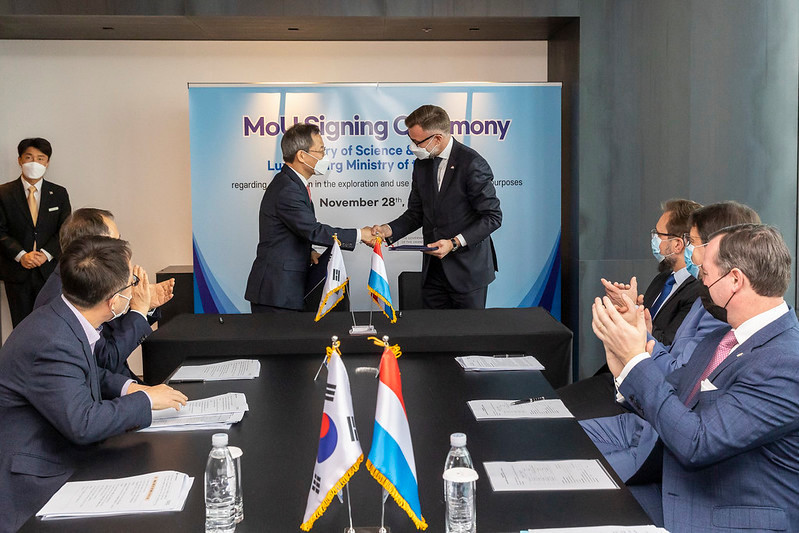“Luxembourg represents the importance of the space sector ahead of other countries and developed technologies and investments in the sector,” Lee said at the signing event. “Korea also recognises the importance of the space industry, as we are entering the age of the space economy.”
--in attendance at the MoU in the presence of Crown Prince Guillaume, among others--called the signing another important milestone, which will “foster the development of common projects to reinforce the collaboration between our two states at very concrete projects between our industries or our research centres and universities.”
As Fayot outlined, the relationship “already established” between the Luxembourg Space Agency (LSA) and the Korea Aerospace Research Institute (KARI) and the Korea Institute of Geoscience and Mineral Resources (KIGAM) “will be furthered even more with this MoU.”
Director general of the South Korea ministry of science and ICT, Hyun-Joon Kwon, explained in general terms what the MoU terms outlined, including “space science, technology and applications, including joint research and development, space policy, law and regulation, space exploration and sustainable utilisation of space resources and space industry and space economy.”
Following the official signing event, part of the business delegation attended the Korea Space Forum at the JW Marriott Hotel in Seoul (where the signing also took place). On Monday afternoon Seoul time, South Korea president Seok-yeoil Yoon presented Korea’s challenges to the space economy, while also announcing the country’s space roadmap.
Korea’s space investments, plans
This year marks the country’s 30th anniversary of establishing KARI, which created Arirang, a world-class earth observation satellite, and a geostationary satellite, Chollian. It has also experience in developing satellite rockets, launch vehicles as well as basic civilian and military compontents, including the first tile-rotor, high-speed drone in the world to be able to take off and land vertically. In June, the country launched its first satellites into space, with the second launch of its Nuri launch vehicle successful from Gohueng, around 500km from Seoul. An earlier one was unsuccessful.
As Yoon explained during his speech at the space forum, Korea’s objectives include extracting on the Moon by 2032 and to be on a Mars launch vehicle by 2045. The goal is for Korea to be one of the five main space nations.
Yoon also announced a fund would be created, and a strategy for private space companies would foresee fostering cooperation with defence for security in space; collaboration on projects with foreign space agencies, including Nasa; using data to prevent disasters, etc.
In April, South Korea announced it would boost its space spending by 19% year-on-year. The $519 investment is 15% more than the government had initially proposed.
South Korea became the 10th country to sign the Artemis Accords, Nasa’s space exploration coalition in May 2021, following Luxembourg being one of in October 2020.
“I believe that we can go beyond just industry cooperation; we can also cooperate in terms of policies like laws and regulations,” Lee said during the earlier Luxembourg-South Korea MoU signing. “And there’s strength that we are located, each part, in Asia and Europe, so it’s a sort of international hub for international cooperation.”
